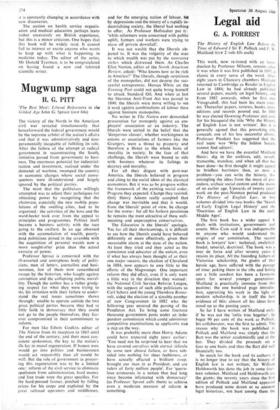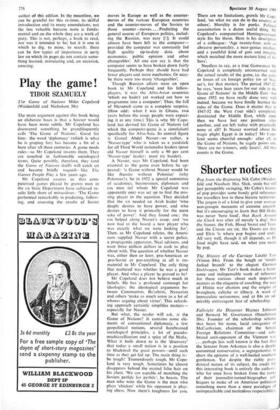Legal aid
G. A. FORREST
The History of English Law Before the Time of Edward Sir F. Pollock and F. W. Maitland (cut' 2 vols 65s each) This work, now re-issued with an intro- duction by Professor Milsom, remains what it was when it was first published in 1895, a classic in every sense of the word. After eight years in Chancery chambers Maitland returned to Cambridge as Reader in English Law in 1884; he had already published several papers, mainly on legal history, and from 1882 onwards, when he first met Vinogradoff. this had been his main inter- est. Thereafter papers, reviews, books, texts. editions and records poured out. In 1888 he was elected Downing Professor and took for his Inaugural the title 'Why the History of English Law is not written'. But it is generally agreed that this provoking title conceals one of his less successful efforts; Professor Plunkett has suggested that the real topic was 'Why the Seldon Society cannot find editors'.
And here we have the essential Maitland thesis: dig in the archives, edit, search. transcribe, translate, and when all that has been done—he first thought it might appeal to briefless barristers then, as now, a problem—you can write the history, dis- entangling the ideas from the maze of pro- cedure, archaic social custom and the mores of an earlier age. Upwards of twenty years' work on the post-Norman period produced The History of English Law, in two volumes divided into two books, the 'Sketch of Early English Legal History' and the 'Doctrines of English Law in the earl Middle Ages'.
The first book has a wider appeal. It deals with institutions, governments and courts. Miss Cam said it was indispensable to anyone who would understand the origins of our constitution. The second book is lawyers' law: technical, analytical. feudal, tenurial, doctrinal. The book was a tour de force and after seventy years it retains its place. All the founding fathers of Victorian scholarship, the giants of that heroic age, have suffered with the passage of time; poking them in the ribs and letting out a little sawdust has been a favourite sport for several younger generations. Maitland is practically immune from this pastime; the one hundred page introduc- tion, appraising his work in the light of modern scholarship, is in itself the best evidence of this; almost all his ideas have stood up to the passing years.
So far I have written of Maitland only: if he was not the `onlie true begetter', he begat 90 per cent of the work as Pollock. his collaborator, was the first to admit. The reason why the book was published as Pollock and Maitland was simply that the Bart was the senior academically and at the bar. They divided the proceeds on a four to one basis, and thus the Bart did well financially too.
So much for the book and its authors: it is no longer true to say that the history of English law is not written; Sir William Holdsworth has done the job in some four- teen volumes. Maitland and Holdsworth are the giants; the seventy years since the first edition of Pollock and Maitland appeared have produced some dozen or so eminent legal historians, not least among them the
author of this edition. In the meantime, we can be grateful for this re-issue, its skilful introduction and its many emendations, not the less valuable because none is funda- mental and on the whole they are a work of piety. This is not, perhaps, a book to read, nor was it intended to be; but it is one in which to dig, to mine, to search; there can be few topics of importance in early law on which its pages do not contain some- thing learned, stimulating and, on occasion, amusing.



































 Previous page
Previous page